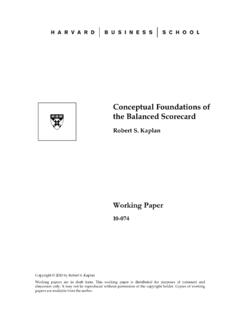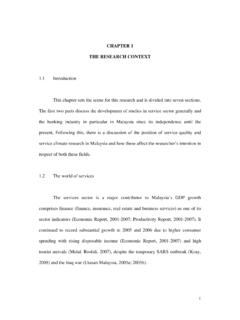Transcription of THE IMPORTANCE OF KNOWLEDGE MANAGEMENT IN …
1 THE IMPORTANCE OF KNOWLEDGE MANAGEMENT IN ORGANIZATIONS WITH EMPHASIS ON THE balanced scorecard LEARNING AND GROWTH PERSPECTIVE Danijela Jelenic Faculty of Economics, University of Nis, Republic of Serbia Abstract: This paper is aimed to show the great IMPORTANCE of KNOWLEDGE as a vital strategic resource for modern business, at the beginning 21st century. The turbulent business environment, with global trends and the stringent competition in the world market resulted in the significant changes that companies should introduce in their current business operations. The changes are necessary for survival in the market. The companies should adapt to changes in the external environment and make changes in the internal environment in terms of innovation, increasing competitiveness, employee training, increasing flexibility, improving processes and business performance.
2 In a KNOWLEDGE economy , the intangible resources are significant resources that add the value. Since the most business processes are viewed through KNOWLEDGE MANAGEMENT , the real challenge, therefore, is developing an adequate system of KNOWLEDGE MANAGEMENT in companies. How much is the IMPORTANCE of KNOWLEDGE transfer through organizations, it is confirmed by balanced scorecard - learning and growth perspective. Its main goals are to raise skill level in performing internal processes, harmonization among employees and companies objectives, improving information systems etc. To increase and maintain the value of intellectual capital, companies invest in education and continual training of its personnel, establish a system of grading employees and their performance, reward and promote quality staff.
3 Obviously, there are the difficulties in carrying out modern systems, especially in developing countries, which include the Serbia. However, there is real hope that local companies will soon experience all the benefits of new systems in practice. Keywords: The organizational KNOWLEDGE MANAGEMENT , balanced scorecard (BSC) system, the BSC learning and growth perspective. 331. INTRODUCTION Peter Drucker said that today KNOWLEDGE has power because it controls access to opportunity and advancement. Twenty-first centuries is undoubtedly the century of KNOWLEDGE . The everyday usage of available advanced information, business and internet technologies in business activities confirm that this is not only a phrase from the literature, but true reality. The globalization has brought many modern trends, and companies have the task to adapt them as quickly, easily and painlessly they can in order to survive in the competitive market.
4 The vital strategic resource today is the KNOWLEDGE individual and organizational. By realizing the major value of intellectual resources, companies have begun to manage rationally and improve them. Hence the IMPORTANCE of KNOWLEDGE MANAGEMENT as a concept of organizational KNOWLEDGE , aimed at effective application of KNOWLEDGE to make quality decisions. In this concept, people have a central role. Intellectual resources, and the first place KNOWLEDGE , contribute to the company as a revenue contribution of products and services, preserve and increase the reputation, through the reduction of operating costs, create barriers to entry of potential competitors, by increasing customer loyalty and create innovation. The success of organizations largely depends on continual investment in learning and acquiring new KNOWLEDGE that creates new businesses and improve existing performances.
5 In that processes, the balanced scorecard as a strategic managerial tool provides the enormous help. 2. THE ORGANIZATIONAL KNOWLEDGE AS THE KEY FACTOR IN MODERN COMPANIES In the light of globalization and modern business, the companies are exposed to the challenges posted by unpredictable and complex competitive environment. The globalized business environment is characterized by changed business conditions, market liberalization, high production, information and communication technology, flexible organizational structure of companies and partnership development. In such an environment, the competition among companies is sharpened in the market (Novicevic & Jelenic, 2008, pp. 137 146). The companies are forced to innovate and develop new techniques for improving the quality and functionality of products, reduce costs and, of course, the answer to the increasingly sophisticated customers demands in order to survive in the market.
6 The changes in the nature of business, the shift to " KNOWLEDGE economy" and the new information age brought new resources that companies use in business processes. In the era of industrialization, companies have created value by the physical transformation of tangible assets (land, buildings, equipment and supplies) into the products. Contrary of the industrial era, in the era of IT, the value of physical intangible resources significantly increases and "intangible" assets are becoming a major source of competitive advantage (Mitrovic et al., 2008, pp. 339 346). The companies-leaders, which care about their high business performance, have realized that the market value of their property increases with greater participation of "intangibles" (intellectual) resources in relation to tangible property.
7 In the period of the 80th years of the last century, the large number of companies property (60 %) was tied to tangible property, and the rest was related to the intellectual resources ("intangible" property). Today, the situation has significantly reversed. The global trend has caused that the company value is largely associated with the "intangible" assets (80 %). The relationship among tangibles and intangibles resources of the world's best-known companies is shown in Picture 1 (Antonic, 2005, pp. 77 82). 34 Picture 1: The approximate relationship between the tangibles and intangibles resources in worldwide companies Source: Adapted from Antonic, 2005, p. 80. In a KNOWLEDGE economy, "intangible" resources are the decisive factors of business success. The modern company recognizes the most business processes as a process of KNOWLEDGE .
8 Therefore, KNOWLEDGE is considered a strategic company s resource, the source of competitive advantage and business success. In the " KNOWLEDGE economy , the focus is on the data, information and KNOWLEDGE as the most important organizational resources. Since the physical, organizational and human resources are limited by availability and price, there is a need that companies manage them rationally and build a responsible approach to the market. Beckman (1997) found that the KNOWLEDGE is way for understanding all about information and data to actively enable performance, problem solving, decision making, teaching and learning of others. Nowadays, one successful company has the ability to learn faster than others, to change, and gained experience quickly turned into action. By this, the organization provides an advantage over competitors, and indeed, survival in the market (Trninic, 2008).
9 New KNOWLEDGE that the companies converted to a commercially applicable KNOWLEDGE can increase their competitiveness by 70 80 % in global business conditions. For evaluating the real value of the company, its stability, possibility of survival and development, it is not enough to observe the company only through its physical assets and financial strength, ( financial and monetary power), as suggested by the top managers and experts. This influenced to the companies to identify and increase the transparency of "intangible" resources, to promote the intellectual capital and corporate KNOWLEDGE through professional development, continuous training and education, with the development of information technology support. The most valuable "intangible" assets are related to relationships with customers, employees and their skills, KNOWLEDGE and organizational culture aimed at innovation, problem solving and general business improvement.
10 By the process of constant KNOWLEDGE renewal, it is possible to create and add value thus increased the commercial transfer of skills and KNOWLEDGE in applied experience. 3. THE AIMS, ABILITIES AND IMPORTANCE OF MANAGING ORGANIZATIONAL KNOWLEDGE Generally speaking, the KNOWLEDGE MANAGEMENT is the process through which organizations generate value from their intellectual capital and KNOWLEDGE -based assets. Usually, the value is obtained by finding what employees, partners and customers know, and sharing information with employees, departments and even with other companies, in order to find best practices. For companies is the most important to understand 'what they know'. This KNOWLEDGE is 35 contained in databases, research and development activities, competent staff and quality products that are supplied in the market.



